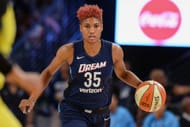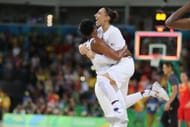2x Olympian and the former No. 1 WNBA Draft Pick Angel McCoughtry has no plans of calling time on her decorated career. The former Atlanta Dream mainstay has been one of the prolific names in the league and is regarded as a bonafide franchise player known for her outstanding scoring prowess, and her ability to breeze past defenses with absolute ease.
What's missing from her silverware cabinet is a WNBA title — one that she's keen on adding. It's only natural that a player destined to go down in history as one of the most skillful scorers nurses desires to get her hands on the championship.
Her formative years saw McCoughtry dominate, topping the Big East Conference in scoring, rebounding, and steals. She broke her records in her junior year at Louisville. The clinical performances saw her earn All-American honors before the WNBA door opened with the Dream drafting her.
Just when it all looked to be a solid ride, Angel McCoughtry suffered injury blows in 2018 and just before the 2021 season. It's been a stop-start-stop run since, and the 38-year-old has found herself looking for a way to get back into the thick of action.
An undeterred Angel McCoughtry spoke to Sportskeeda exclusively ahead of the new year and was candid when talking about the need to come back, the grueling recovery process, and what she brings to the table if one of the 13 franchises makes a beeline for her services of the next season.
The 2x WNBA scoring champ also shed light on the modern-day WNBA, her key message for alma mater product Angel Reese, and her plans for 2025.
Note: This one-on-one interview has been condensed and edited.
Aside from the goal of winning a WNBA title, what is the key reason behind Angel McCoughtry looking for a WNBA return?
Angel: I never really left. I never left the game, I just didn't get picked up so I never retired. I feel like I was just in that process of trying to heal my body and came back too early when I was in Minnesota. I wasn't myself yet and just needed a little more time. But all I need now is just for somebody to believe in me again. It hurts me to have to say that but I believe in myself and I know that I can play and help teams and continue to try to win a WNBA championship for sure
What was the mindset like when the injuries came in as a double-whammy? How does it affect an athlete mentally?

Angel: It's probably the worst thing. It's very challenging mentally… the depression behind it. You are a person who can run, jump, and do everything. And then all of a sudden it stops. That's why my heart goes out to anyone who deals with disabilities... someone who's lost a leg or an arm. I can't even fathom the thought. But yet if you see these people, they still have smiles on their faces and they continue to do everything. So it's just that challenge behind it, 'Yo, you gotta come back. You can do this.'
Now, for the most important question: How are you feeling now?
Angel: I feel great. I wish I was in this best shape when I was 20. I'm 38 and in the best shape of my life. With technology today things are a lot better. I'm just great. I'm dunking. Come on! Who's dunking at 30?
Klay Thompson remembered how Kobe Bryant was influential in helping him during his injury setback. Did you have someone to reach out to during the challenging phase?
Angel: I think about Seimone Augustus. Her story resonates with me getting back. She had torn her ACL, and I remember she had been let go of the Olympic team. And she came back and dominated. So her story is very influential to me.
From winning the Rookie of the Year to setting and breaking records, how do you sum up the WNBA journey so far?
Angel: I think it's been rough because nobody knew who we were as WNBA players, right? We didn't have the brands behind us like we do now. The popularity wasn't there. I remember being that a number one draft pick was only making $44, 000. So the growth now that we put the blood, sweat, and tears behind it for the young women now to reap the benefits of it… It's amazing.
What can teams expect from you going into 2025?
Angel: I can do anything that a team needs. I'm a leader. I've been a leader for a long time. I'm great in the locker room. There's something about when I'm on a team I help people become better. It's that Jordan factor.
You just help people around you and raise their level. That's the kind of person I am. I raised people's levels just because of my hard work and my dedication. People around me, they follow that. I have the aggression, a dog in me when I play on the court that I think a lot of the girls follow. It’s the winning mentality. I don't have to be trying to score 40 points. We have enough girls that can do that. I can help them get to 40.
Adapting to the fast-paced nature of the game
Angel: The game has always been fast-paced. Nothing's changed. My body's used to it. You know what I mean? I just think now that I'm better at 38 than I was at 20 because I'm smarter. I understand it and I know things. I see things before it can happen. You know if she's quicker than me, I'll figure it out. It's trust and belief, so age is a good thing. The older, the better. We age like fine wine.
How was the WNBA changed?
Angel: The game hasn't changed. The only thing that has is when I say the new type of WNBA is new fans, more popularity, and people recognizing more of the women. The new WBA is the new fame behind it, the fans, the new brands, that's the modern-day WNBA. But the game has always been the same. It's always quick, always physical, and always exciting just the way it is now.
The recent discussion is the need for 3s, and teams looking for prototypical 3-and-D wings...
Angel: I think that's always been there. I've seen throughout my career there's been a lot of deep shooters on the three. Women can just hit the three. The popularity of Steph Curry and the way he shoots threes just heightened the 3-game. But in the women's game we've always shot a lot of threes, know everybody else is just catching on.
You recently called Diani Taurasi an inspiration in one of our earlier interviews. What's your takeaway from the icon after interacting with her last year before the Olympics

Angel: I took a lot of things from her (Diana Taurasi) throughout the years. Like just her leadership, her tenacity, how hard she plays, and how she's just tough out there on the court. I took a lot of those things. I think now that I watch her, she just keeps her body in top shape at her age. She's always been great and is just a great example for a lot of the girls.
You had a basketball camp with Angel Reese in 2023. What message do you have for the young phenom?
Angel: Become the best. You have the opportunity to be the best with your brand and be the best all around. Just the best basketball player and the best role model. You can do it all when you're in that position. So the main thing is to stay focused and just be the best at everything you touch.
Forward to 2025, what's on the list?
Angel: I have a lot of plans for 2025. Of course, number one is to get back on the court. Besides that, I am doing a TV show to highlight women's athletes off the court. The more shows we have for women, the better. I think through these shows and then they can see we have a lot of executive producers who are male athletes.. but then to see young women athletes are executive producers.
We do movies, we do music too. We do all the things that men can do. I have my basketball court in Atlanta. A lot of girls don't have that. And they can see my image where they can see like, ‘Wow, I can be this. I am the next Angel Reese. I am the next Caitlin Clark. I am the next Angel McCoughtry, Diana Taurasi, Sylvia Fowles, Candace Parker, and Sue Bird. So that's what's important for 2025, pushing the content, getting back in the league, and being the example for these young women, because these are the years of the women.
